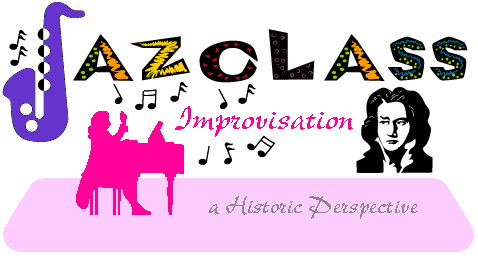
On Improvisation
(Jazclass Links - Notes on Notes)
When talking about improvisation one immediately thinks Jazz. This seems quite
normal, but it is an abnormal situation when seen in a historical context.
Improvisation has been an integral part of music since the very beginning of music, and it has been a very important element in Western Classical music for most of the
past 1000 years.
Here are just a few examples :
-
Original score notations for Mediaeval organ music for example, commonly include instructions
for improvisation and embellishments. The scales that were used were selected according
to the same improvisation principles now used in Jazz.
- When the single voice Plainsong started to develop into the 2, 3 or 4 part Organum (during the mid Mediaeval Period 1000 - 1300)
, one or more of the parts were also commonly improvised, weaving free counter lines
around the written melody line.
- Later, during the Baroque - (1600 - 1750), Classical - (1750 - 1830), and Romantic
- Periods (1830 - 1900) improvisation flourished, especially for keyboard players.
J.S.Bach, Handel, Mozart, Beethoven, Liszt and many other distinguished composers
and virtuoso pianists, excelled in the art of improvisation, in those days called 'extemporisation'.
- Many classical scores contained sections for improvisation. The preludes to keyboard suites by Bach and Handel for example consisted solely of
a progression of chords. The performers used these as basis for their improvisation
(just like in Jazz).
In the scores of to day most of these progressions have been
translated into full music notations by various editors.
- Liszt was a famous boy improviser. At age 12 his concert in Manchester was advertised as 'An Extemporary Fantasy on the Pianoforte by Master Liszt, who will respectfully request a written theme from any person present.'
- In 1895 Miss Marie Wurm gave a complete recital in London upon themes handed to her by members of the audience.
This was probably one of the last of such Classical improvisation performances.
Around the beginning of this Century improvisation suddenly (and inexplicably) disappeared
from the Classical performances (see Footnote *), and Classical music as a whole has been totally
dominated (and restricted) by the written score.
This has had, I believe, a detrimental effect on the knowledge and understanding of
fundamental music principles by the majority of classical music students.
For good improvisation skills rely on a thorough understanding and knowledge of chords, chord progressions and chord - scale relationships. The written score on the other hand can be (and usually is) played without such knowledge.
The demise of extemporisation has also had its effect on the teaching of classical harmony.
A rare exception is the text 'Harmony in Western Music' by Richard Franko Goldman
(1965, Published by W.W.Norton & Company, Inc. , New York).
(It is out of print but you may find a 2nd hand copy - try AMAZON.com.)
This is a brilliant book which
I strongly recommend to all Jazz
students with an interest in harmony.
Goldman writes in the (1965) Preface of his book :
"For some reason, generally unexplained, all music students 'take' a year or more
of harmony. What they learn is in many cases a mystery. The emphasis of the usual
harmony course is on having the student complete a number of exercises with reasonable
'correctness'. Whose correctness is seldom defined. It is often a notion of correctness
based on the style of Bach's chorales. But sometimes one wonders what is achieved."
|
Many of my own music students are adults with classical music training
behind them.
Most have come to me in frustration, for they have only learned to play the black
dots, but have no idea what they mean.
To me these students are a continuous source of fulfilment, for it is
most rewarding to be able to open up their eyes to a better understanding and appreciation
of the beauty of music.
The emergence of Tertiary Jazz Institutions in the 60s and 70s throughout the Western
world, and their subsequent integration with Classical Institutions (as in Australia),
are also having a positive effect on the modern day understanding of music.
Modern Classical composers (such as Lucas Foss and others), as a reaction to the stifling
effect of the written score, and encouraged by the example of Jazz music, also compose again with
elements of improvisation incorporated in their works.
| I sometimes think about this ironic paradox :
The people we (Westerners) brought as slaves to the Western world (the African Americans),
are the very people that (through their art of Jazz improvisation) helped us :
- to regain
our musical freedom from the imprisonment of the written score,
- and to rediscover an art we had lost.
We surely must be grateful for that.
Michael.
|
Any Comments ?
* FOOTNOTE (Back up)
A few other types of European music have not suffered from the 'drought', and continued uninterrupted with their tradition of Improvisation. They include for example the Hungarian Gypsy music, the Spanish Flamenco, Irish folk music ("The Furies") and of course the organ improvisation in churches.) |
(Top - Jazclass Links - Notes on Notes)
Copyright © 1999 Michael Furstner. All rights reserved.
|
